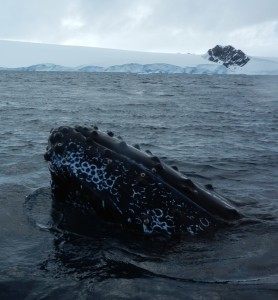A humpback whale in Antarctica (photo credit: Chris Parsons)
Earlier this year the International Court of Justice (ICJ) ruled that Japan’s so-called “scientific whaling” in Antarctica (the JARPA II research program, to give its official title) was illegal. Article VIII of the International Convention on the Regulation of Whaling allows the lethal take of whales for scientific research purposes by “special permit.” The ICJ ruled, however, that the Japanese program was in violation of this provision, because JARPA II was not bona fide scientific research but was instead de facto commercial whaling.
The Japanese Government initially stated that it would abide by the ICJ’s decision and discontinue JARPA II, but then later announced it would conduct a new research program in the Antarctic (JARPA III?). This sudden turnabout was less based on science or market forces than politics, no doubt – sales of whale meat in Japan have been declining and there is currently a warehoused surplus. It may have also been influenced by NGOs (specifically Sea Shepherd) publicly claiming to have “defeated” the Japanese Government and forced them to end the Antarctic hunt (for the record, Sea Shepherd was not involved in the ICJ court case at all, and can claim no responsibility for the outcome). For the fiercely proud and nationalistic Japanese politicians, to have a small NGO – which they have labelled a “terrorist organization” – beat them would be politically untenable.
Read More “Wailing about whaling – the 2014 International Whaling Commission meeting” »

